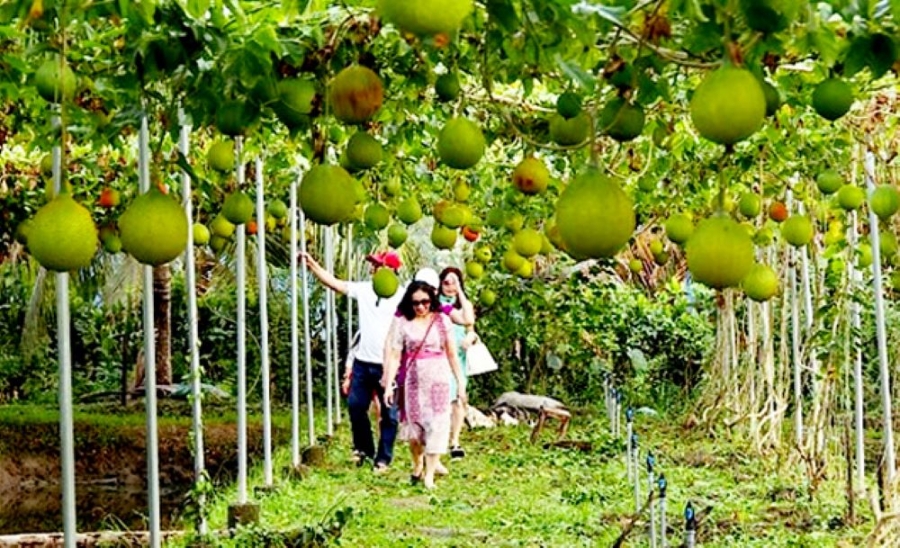
At the technical consultation workshop titled “Ecological agriculture transformation, agriculture based on nature‑based solutions: Contributions to transitioning toward a sustainable food system in Vietnam,” organized by the Institute of Agricultural Planning and Design on 26 August 2025, experts argued: “When policy, finance, markets, and farmers close the value‑circle loop together, ecological agriculture will cease to be just a ‘beautiful idea’ and become the norm for development—protecting livelihoods today while opening a green future for the country.”
GAP BETWEEN VISION AND FIELDS REMAINS WIDE
Dr. Bùi Hải Nam, Deputy Director of the Institute of Agricultural Planning and Design, stated that Vietnam is promoting the transformation of its food system in connection with sustainable development goals and a commitment to net zero emissions by 2050. Agriculture—the livelihood of nearly two-thirds of the rural population and one of the three largest emission sectors—must therefore shift toward an ecological, circular, low‑carbon model.
Researching, reviewing, and proposing ecological agriculture models and nature‑based solutions to support policy making and expand effective practices is increasingly urgent. This activity falls within the framework of the UN Joint SDG Program in Vietnam on “Promoting innovation in financial partnership mechanisms for transforming the food system,” implemented by UNDP in coordination with UN agencies.
According to Dr. Nam, in the context of increasingly severe climate change, ecological agriculture and nature‑based solutions (NbS) are emerging as indispensable directions for Vietnam’s agriculture. Organic models, smart farming, along with growing international cooperation programs, have yielded promising initial results. Ecological agriculture in Vietnam has shown positive movement.
“Vietnam has established policy frameworks and made strong commitments to net zero by 2050, but the gap between vision and fields remains wide. Unless farmers see concrete benefits, ecological agriculture will remain trapped in pilot projects,” Dr. Nam emphasized.
A major paradox, Dr. Nam continued, is that the journey of turning ecological agriculture into an economic driver still has many gaps to fill.
“Policies are voluminous but technical capacity is thin. The agricultural extension system is inflexible, logistics remain cumbersome, on‑site technical services are inadequate. Many highly rated models still easily fall into the pilot trap,” he warned. To resolve this paradox, a “value‑chain closure” mechanism is needed—where policy, finance, markets, and farmers operate within a closed loop. In this way, farmers become not only implementers, but genuine central actors in the transformation, turning ecological agriculture from concept into economic driver.
NEED TO ESTABLISH NATIONAL STANDARDS FOR ECOLOGICAL AGRICULTURE
A key bottleneck for ecological agriculture is capital. Banks are hesitant to provide unsecured loans due to risks from natural disasters and epidemics, while agricultural insurance mechanisms remain incomplete. “Without insurance mechanisms, how can farmers and cooperatives boldly embrace the ecological path?” asked Ms. Nguyễn Thị Thịnh, CEO of Mục Đồng Organic.
To adapt, Mục Đồng relocated its farm infrastructure to Hòa Bình, raising cattle based on the “five no’s” philosophy. Manure is converted into biofertilizer, solar power replaces grid electricity, plastic bottles are reused. This closed‑loop model saves tens of millions of đồng annually and generates employment for the community. According to Ms. Thịnh, the product is not just milk, but an inspiring ecological story emerging from rural reality.
This story mirrors the experience of Mr. Trần Mạnh Chiến, Director of Bác Tôm Clean Food. He mentioned the PGS system: a “participatory certification system” involving farmers, retailers, and consumers. Less costly than international certification, PGS persists through trust and collaboration. From 4 organic produce stores in 2009, Bác Tôm now has over 100 outlets, becoming a “bridge keeping the flame alive” for the organic market.
Nevertheless, Mr. Chiến noted that both PGS and other organic models suffer from the same limitation: short‑term, limited capital insufficient to support long‑term strategies.
Mr. Vũ Thái Trường, Head of Climate Change and Environment at UNDP Vietnam, also observed that without green credit and proactive community involvement, ecological agriculture cannot be sustainable. Conversely, when capital flows are opened and communities become co‑owners, agricultural products can integrate with eco‑tourism and local culture—enabling farmers to retain added value rather than losing it.
Ecological agriculture is no longer an experimental option; it has entered the stage of becoming a mandatory standard, linked to national food strategies, multi‑value development, and sustainability.
Mr. Vũ Thanh Liêm, Deputy Director of the International Cooperation Department (Ministry of Agriculture and Environment), affirmed: “Ecological agriculture not only protects biodiversity but is key to creating an agricultural system resilient to severe shocks.” Therefore, it is necessary to establish clear standards, accompanied by green finance mechanisms, carbon credits, and public‑private partnerships. Only when tied to concrete resources and transparent measurement frameworks can ecological agriculture escape being merely a slogan.
From an international perspective, Dr. Nguyễn Quang Tân, Country Coordinator of ICRAF, cited examples: India trains thousands of extension workers to promote ecological models; the Philippines rehabilitated slopes through green infrastructure; Indonesia saved peatlands through agroforestry combination. These examples show that when ecological agriculture is placed within an official framework, millions of farmers can change practices and stabilize livelihoods.
In Vietnam, ICRAF‑implemented models in Lào Cai and Phú Thọ have reduced chemical fertilizer use by up to 70% while maintaining stable yields. However, Dr. Tân warned that to prevent these results from being “mere highlights in reports,” there must be space for “farmers teaching farmers”—the most authentic and effective knowledge diffusion.
Source: vneconomy.vn




